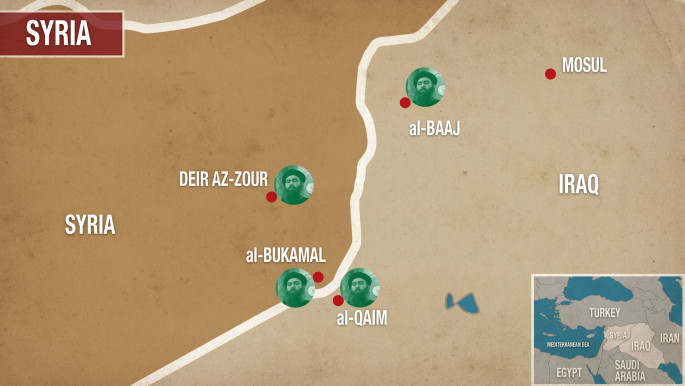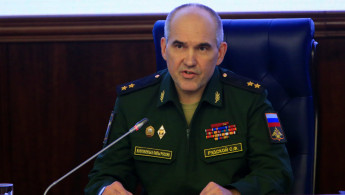Russia intensifies airstrikes on IS-stronghold Deir az-Zour
Russian jets are now making 60 to 70 flights a day to target militants heading from other areas to join the fight in the eastern city, Col. Gen. Sergei Rudskoi said.
He said Syrian troops are meanwhile advancing from three directions to encircle Deir az-Zour.
Syrian regime forces control around half the city and a nearby air base, both of which are besieged by the militants.
Rudskoi said militants fleeing US-backed offensives in the Iraqi city of Mosul and the Syrian city of Raqqa have poured into Deir az-Zour in recent months.
He said Syrian forces have also encircled Akerbat, an IS-held town in central Syria, and that Russian warplanes have targeted militant convoys trying to flee the area for Deir az-Zour.
Russia has waged an air campaign in Syria since September 2015 aimed at helping Assad's forces defeat IS as well as Syrian rebel groups.
This month alone, Russian warplanes have flown 990 missions, destroying 40 armoured vehicles, more than 100 trucks and killing about 800 militants, Rudskoi said.
Those casualties include more than 200 militants killed in a recent raid on an IS convoy heading toward Deir az-Zour, according to the Russian Defense Ministry.
 |
Rudskoi said the creation of de-escalation zones in Syria has helped the Russian military to focus on battling IS.
Under a plan approved in May by Russia, Turkey and Iran that applies to three areas of the country, the Syrian regime and rebels have agreed to cease hostilities, halt regime air raids and improve humanitarian access. Russian military police are monitoring compliance at checkpoints around the three zones.
The cease-fires comes in the run-up to another round of UN-sponsored peace talks in Geneva.
Meanwhile, three Syrian opposition camps met in Riyadh on Monday to try to forge a unified front for what the UN hopes will be a substantive round of peace negotiations in October.
The Saudi-backed opposition High Negotiations Committee (HNC) held an hours-long meeting in a Riyadh compound with delegations from two other moderate camps, the so-called Cairo and Moscow groupings.
UN Syria envoy Staffan de Mistura has sought to unify the opposition to develop a more pragmatic negotiating strategy after hosting seven rounds of largely unsuccessful talks.
The main obstacle has been the fate of President Bashar al-Assad, with the HNC insisting on his ouster but the other two camps adopting a softer stance on the issue.
"The goal of the meeting is to arrive at an agreement on the political programme that forms the basis of the negotiations. At the forefront is the position on Bashar al-Assad," Syrian opposition leader Ahmed Ramadan told AFP this week.
There was no immediate comment on the conclusion of Monday's meeting.
De Mistura said last week that he hopes for "real, substantive" peace talks between the regime and a still-to-be-formed unified Syrian opposition in October.
Rebels have suffered heavy territorial losses since peace talks to end the war began, including the regime's recapture of Aleppo, a former opposition stronghold.
With the rebel fighting position weakened, experts say the regime faces no pressure to make concessions at the negotiating table, and especially not over the question of Assad's future.
De Mistura has said he may still try to organise another "preparatory" round of talks in Geneva next month, but stressed that his office will be focusing on the agenda for "substantive talks" aimed for October.
Agencies contributed to this report.





 Follow the Middle East's top stories in English at The New Arab on Google News
Follow the Middle East's top stories in English at The New Arab on Google News
![The UAE is widely suspected of arming the RSF militia [Getty]](/sites/default/files/styles/image_330x185/public/2024-11/GettyImages-472529908.jpg?h=69f2b9d0&itok=Yauw3YTG)
![Netanyahu furiously denounced the ICC [Getty]](/sites/default/files/styles/image_330x185/public/2024-11/GettyImages-2169352575.jpg?h=199d8c1f&itok=-vRiruf5)
![Both Hamas and the Palestinian Authority welcomed the ICC arrest warrants [Getty]](/sites/default/files/styles/image_330x185/public/2024-11/GettyImages-2178351173.jpg?h=199d8c1f&itok=TV858iVg)